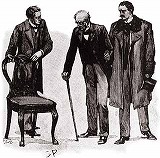“Some weeks ago Mr. Blessington came down to me in, as it seemed to me, a state of considerable agitation. He spoke of some burglary which, he said, had been committed in the West End, and he appeared, I remember, to be quite unnecessarily excited about it, declaring that a day should not pass before we should add stronger bolts to our windows and doors. For a week he continued to be in a peculiar state of restlessness, peering continually out of the windows, and ceasing to take the short walk which had usually been the prelude to his dinner. From his manner it struck me that he was in mortal dread of something or somebody, but when I questioned him upon the point he became so offensive that I was compelled to drop the subject. Gradually, as time passed, his fears appeared to die away, and he renewed his former habits, when a fresh event reduced him to the pitiable state of prostration in which he now lies.
“What happened was this. Two days ago I received the letter which I now read to you. Neither address nor date is attached to it.
“A Russian nobleman who is now resident in England [it runs], would be glad to avail himself of the professional assistance of Dr. Percy Trevelyan. He has been for some years a victim to cataleptic attacks, on which, as is well known, Dr. Trevelyan is an authority. He proposes to call at about a quarter-past six to-morrow evening, if Dr. Trevelyan will make it convenient to be at home.
“This letter interested me deeply, because the chief difficulty in the study of catalepsy is the rareness of the disease. You may believe, then, that I was in my consulting-room when, at the appointed hour, the page showed in the patient.
“He was an elderly man, thin, demure, and commonplace - by no means the conception one forms of a Russian nobleman. I was much more struck by the appearance of his companion. This was a tall young man, surprisingly handsome, with a dark, fierce face, and the limbs and chest of a Hercules. He had his hand under the other’s arm as they entered, and helped him to a chair with a tenderness which one would hardly have expected from his appearance.

“ ‘You will excuse my coming in, Doctor,’ said he to me, speaking English with a slight lisp. ‘This is my father, and his health is a matter of the most overwhelming importance to me.’
“I was touched by this filial anxiety. ‘You would, perhaps, care to remain during the consultation?’ said I.
“ ‘Not for the world,’ he cried with a gesture of horror. ‘It is more painful to me than I can express. If I were to see my father in one of these dreadful seizures I am convinced that I should never survive it. My own nervous system is an exceptionally sensitive one. With your permission, I will remain in the waiting-room while you go into my father’s case.’
“To this, of course, I assented, and the young man withdrew. The patient and I then plunged into a discussion of his case, of which I took exhaustive notes. He was not remarkable for intelligence, and his answers were frequently obscure, which I attributed to his limited acquaintance with our language. Suddenly, however, as I sat writing, he ceased to give any answer at all to my inquiries, and on my turning towards him I was shocked to see that he was sitting bolt upright in his chair, staring at me with a perfectly blank and rigid face. He was again in the grip of his mysterious malady.